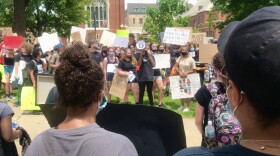This is the second installment in a three-day series. It aired on Tuesday, June 23, 2020.
Across the country, African-Americans have protested with white allies in united outrage over George Floyd dying in police custody in Minneapolis last month. In Kalamazoo, the vast majority of participants at the larger protests have been white. But as people of color start to plan next steps, some wonder: Will allies continue to work to end systemic racism once the big demonstrations stop?
This is the story of Kim Guess, one of three African-Americans we interviewed about their hopes for America after the protests. The mother of an 8-year-old son is a lifelong resident of Kalamazoo's mostly Black North Side neighborhood. She participated in one protest, her first one ever.
Thank God that there are people willing to change, or willing to see, or willing to be better and to treat people equally
"It was unusual for me actually to participate in a protest," she says. "...I felt it was something I had to do. Just currently with Ahmaud Arbery, Breonna Taylor and George Floyd, I feel like this is a time not to be silent."
And if you're silent?
"No matter your color, you are aiding in what is happening in the world right now.”
The Conversation
Guess' husband died in November, so now she says the full weight of raising a Black boy in America rests on her shoulders. And with that weight has come tough conversations about race, lately.
“I didn’t have 'The Conversation' with him until George Floyd, and I had to because it’s on TV," she says. "The Black Lives Matter movement kind of just sparked, and it’s everywhere, from turning on your Amazon Prime to me turning on YouTube to, you know, commercials. And he’s sitting here watching and he’s asking: ‘Who is this guy that I keep seeing on TV?’"
More than ever, you see a lot of bi-racial kids. You see a lot of friendships between and Black and white people to the point where a lot of them can't just sit anymore. They don't feel comfortable acting like it didn't happen.
She told her son, L.J., short for LaVelle Javon, what had happened to Floyd, and that led to more questions: Are all white people bad? She said no.
"I said there’s some really good people. And he said, ‘Like Mr. Floyd?’ So Floyd is my next-door neighbor...his first name is Floyd."
Guess says Mr. Floyd, whose wife and himself have small children, has taken L.J. under his family's wing since her husband passed away. She says they all treat one another's children as if they were their own, even taking the other's kids on outings.
But then, she also had to tell her son....
"There’s people in this world that don’t act like that. They weren’t raised that way. He asked why. I said I don’t know. And I said there was a time when we were all separated, and it’s hard for people to change. And I said, but, thank God, that there are people willing to change, or willing to see, or willing to be better and to treat people equally.”
Her son has had a strong reaction to George Floyd's death. Guess says he had wanted to be a police officer. No more.
“He’s like, 'I don’t know if I want to be a police officer anymore because I don’t want to have to kill anybody.'"
'Can't just sit anymore'
But one reality is forcing change, according to Guess. With America becoming more racially diverse, she believes that it's getting harder for non-people of color to ignore the violence due to skin color. She says "our lives are so intertwined," these days.
"More than ever, you see a lot of bi-racial kids. You see a lot of friendships between and Black and white people to the point where a lot of them can’t just sit anymore. They don’t feel comfortable acting like it didn’t happen."
Click on the audio to hear Kim Guess sharing more of her story, including her protesting experience and a new local group fighting for justice.
Tune in at 7:50 a.m. and 4:50 p.m. on Wednesday, June 24 to learn about a wonderful thing that Kim Guess says has happened because of this movement. That's the final installment in the series. It has aired since Monday during Morning Edition and All Things Considered on WMUK 102.1 FM, the National Public Radio Station based at Western Michigan University.






